In this second part of a three-part series covering the Winnipeg Jets’ offseason to-do list, I’ll be discussing the team’s defensemen. In part one, I discussed forwards, and in part three, I’ll cover the goalies, estimated total cap hit, and predictions for the 2019-20 season.
An Overview of the Jets’ Remaining Defensemen
The following is a depth chart of the team’s defensemen, including players under contract or owned by the Jets (RFAs), for the 2019-20 season:
| LD | RD |
| Morrissey | Trouba (RFA) |
| Morrow (RFA) | Byfuglien |
| Beaulieu (RFA) | Kulikov |
| Niku | Poolman |
While the list looks normal enough, it assumes that the Jets re-sign all of their RFA defensemen, which is an awfully bold assumption in the case of Jacob Trouba. In fact, it seems unlikely that the Jets’ defense will look like this come the start of the 2019-20 season.
All signs point to Trouba leaving the club, given that he sat out and requested a trade in 2016, had a negotiation stalemate in 2018, and hasn’t shown tremendous interest in staying in Winnipeg long-term. If Trouba does get traded, it will leave a big hole to fill on the team’s top defensive pairing, assuming Dustin Byfuglien stays on a separate pair. Regardless of how the lines are organized, with the departures of UFAs Ben Chiarot and Tyler Myers and the presumed departure of Trouba, the Jets’ defense will look dramatically thinner (and weaker) than last season.
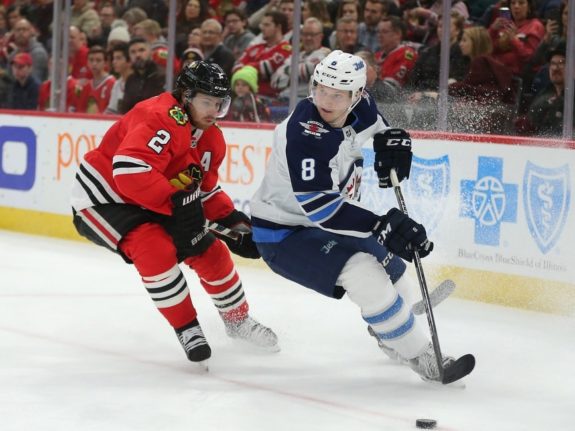
This isn’t to say that Nathan Beaulieu, Joe Morrow, Sami Niku, and Tucker Poolman are poor defensemen. Rather, the issue is that all of these players have inconsistent and/or limited track records.
Morrow looked solid in his time with the Jets, but despite having been a first-round draft pick in 2011 (23rd overall), he has never been a full-time defenseman in his five seasons of play. The closest he got to full-time was during the 2017-18 season, which was also his best season, when he played 56 games and scored 6 goals and 10 assists, approximately one-third of his total games (162) and half of his points (32). That isn’t much of a track record.
The same can be said about Beaulieu. While he also played well with the Jets, has more games (332) and points (81) under his belt, and has a similar pedigree (17th pick overall in 2011), he was a healthy scratch for the Buffalo Sabres just prior to being traded to the Jets this season. It’s unrealistic for the Jets to count on Beaulieu either.
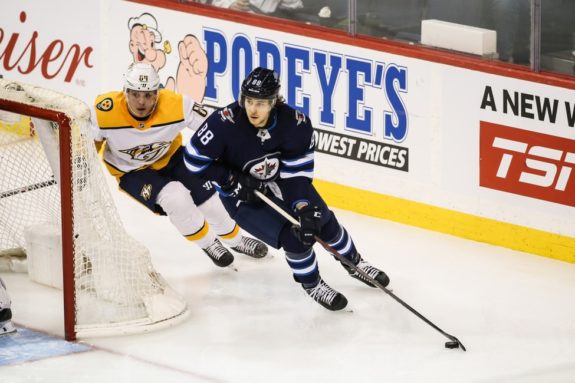
After those two defensemen, you have two near-rookies in Sami Niku and Tucker Poolman. While Niku has only played 31 games and produced five points in the NHL, he was voted the AHL’s outstanding defenceman after playing the 2017-18 season with the Manitoba Moose. This says a fair bit about his potential. Poolman managed to stick with the Jets for 24 games of the 2017-18 season and didn’t look out of place, but he played all of this past season with the Moose. While both players are great prospects for the Jets, it would be bold to pencil them in as the sixth and seventh defensemen and expect them to do well.
Lastly, similar to their situation with Mathieu Perreault, the Jets are likely stuck with Dmitry Kulikov’s contract. While he has been steady enough for the Jets, he only played an average of 15:40 minutes/game and produced six points (all assists) in 2018-19. His stats for the previous season were equally underwhelming (17:04 minutes/game; 3 goals and 8 assists). In both cases, his performance hasn’t been (and likely won’t be) worth his cap hit of $4.333 million; a third-pairing defenseman playing limited minutes can’t be worth that high a price tag. Given a Modified No-Trade Clause, limited to no value (or maybe even negative value) to a trade partner, and the cost-benefit of buying him out, I think the Jets might be stuck with him for one more season.
Trading Trouba Needs to Happen Before Arbitration
Given the rocky history between Trouba and the Jets and the team’s lack of cap space to sign him, it seems unlikely that the two parties will strike a deal. Also, one can assume that a trade partner would find more value in negotiating with and signing a player directly than in taking on a player that has already received an arbitration result. Moreover, if the Jets wait until after training camp begins to trade assets, the team will risk having those assets lose value due to injury. Finally, since the Jets have lots of signings to take care of, it would be easier for the team to know where they stand financially if Trouba was traded sooner rather than later. Therefore, it’s clear that if the Jets are going to trade Trouba, it needs to take place before they go to arbitration.
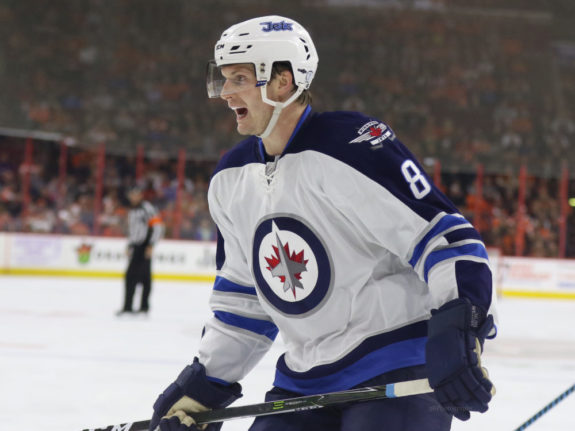
If the Jets decide to trade Trouba, they need an affordable and serviceable roster player to fill his spot given what would remain. Specifically, the Jets need a young, RFA defenseman (not due for a raise as high as Trouba’s) or one with an affordable cap hit. If the organization expects to get by without that kind of return, they could be in big trouble.
Rather than go into greater detail about why the Jets should trade Trouba, when they should do it, and what they should aim to receive in return, it’s complex enough to deserve its own article at a future date.
Jets Should Re-Sign Beaulieu and Morrow
As discussed earlier, both Beaulieu and Morrow performed well in the games they played for the Jets. After he was acquired on Trade Deadline Day, Beaulieu was thrust into the top defensive pairing alongside Trouba, with Josh Morrissey out due to injury. There, he didn’t simply tread water but actually excelled with increased responsibility and ice time. Regarding Morrow, he’s fit right in as a depth defenseman, playing 41 games during the 2018-19 season, and was a playoff hero during the team’s run to the Conference Final in 2017-18. As a result, re-signing both players is a no-brainer, especially if their contracts turn out to be as inexpensive as I expect them to be.
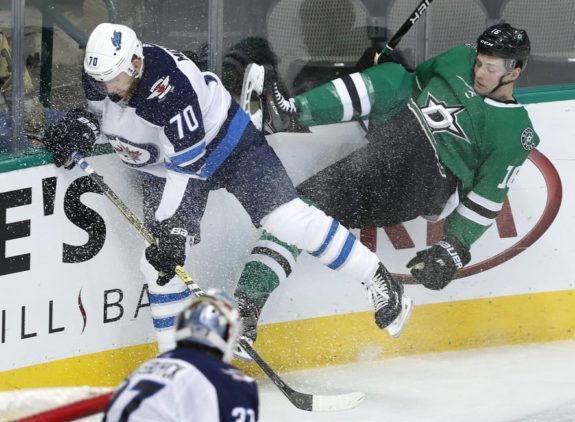
Regarding Morrow, I would expect his contract of $1 million to decrease given he played comparatively fewer games (41), earned fewer points (7), and averaged less ice time (13:58 min/game) than last season (56 games, 16 points, 16:44 min/game). I would estimate he should receive somewhere around $850,000 for one year.
As for Beaulieu, he had a dramatic decrease in performance since receiving his contract in 2017 at $2.4 million/year for two years. In fact, he went from 64 games, 19 points, and 17:27 min/game of ice time in 2015-16 and 74 games, 28 points, and 19:29 min/game in 2016-17 down to 59 games, 9 points, and 15:57 min/game in 2017-18 and 48 games, 12 points, and 15:30 min/game in 2018-19. Moreover, since he’s been traded twice, was a healthy scratch before joining the Jets, and was a healthy scratch during the playoffs with the Jets, it looks like he’ll get a dramatic pay decrease. Expect Beaulieu to make a little more than what Morrow made last season given their similar performance but Beaulieu’s better track record. I’d estimate it to be in the range of $1.4 million for one year, similar to the Michael Del Zotto situation and signing in 2014.
Summary & Potential Depth Chart for the 2019-20 Jets’ Defense
Based on all of the above, here’s how I think the Jets will organize their defensemen to start next season:
| LD | RD |
| Morrissey | Other (from Trouba trade) |
| Beaulieu | Byfuglien |
| Kulikov | Niku |
| Morrow | Poolman (AHL) |
Estimated cap hit (in $ millions):
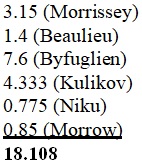
While I will delve into this further in the next/last article of this three-part series, with a quick addition of the above to the previous post’s higher estimate for forwards ($52.424 million), Connor Hellebuyck’s salary ($6.167 million/year), and a $1 million/year backup, the total salary for the Jets would be $77.699 million. If you also use my cap estimate from the previous post of $82.41 million, the Jets would conservatively have around $ 4.711 million to spend on a replacement for Trouba (listed above as “Other”). This lines up perfectly with the salary the Jets could expect to pay for a target return in a trade.
If things go my way, I think the Jets could even afford to re-sign Myers. In fact, I’m predicting the Jets will be able to keep Myers for at least a couple more years, but you’ll have to check out the third part of this series to see how!